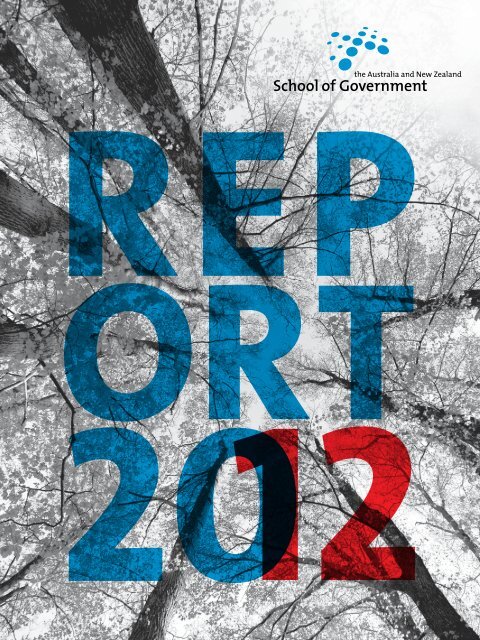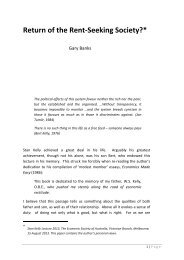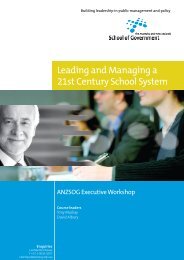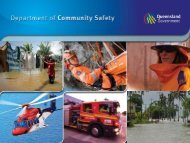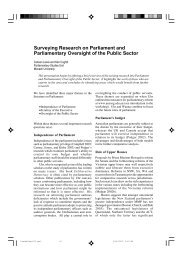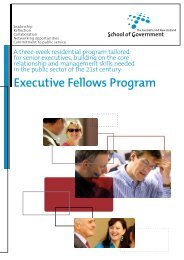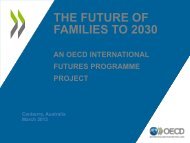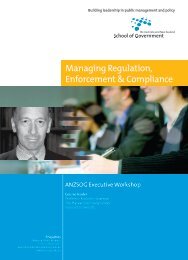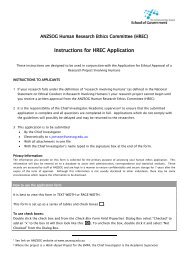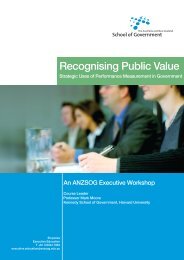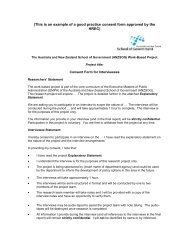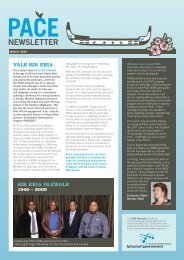ANZSOG Report 2012 - Australia and New Zealand School of ...
ANZSOG Report 2012 - Australia and New Zealand School of ...
ANZSOG Report 2012 - Australia and New Zealand School of ...
You also want an ePaper? Increase the reach of your titles
YUMPU automatically turns print PDFs into web optimized ePapers that Google loves.
VisionThe <strong>Australia</strong> <strong>and</strong> <strong>New</strong> Zeal<strong>and</strong> <strong>School</strong> <strong>of</strong> Government (<strong>ANZSOG</strong>) was established withthe vision <strong>of</strong> creating a world-leading educational institution that teaches strategicmanagement <strong>and</strong> high-level policy to public sector leaders. The <strong>School</strong> acts as a trustedfacilitator that helps governments find solutions to real world public issues.<strong>ANZSOG</strong> is dedicated to creating value for the public by:• providing world-class education for public sector leaders• delivering programs that build new policy, research <strong>and</strong> management capability• conducting research that makes a significant contribution to policy knowledge• encouraging public sector innovation.ContentsAbout <strong>ANZSOG</strong> 1Farewell from the Dean 2Governance <strong>and</strong> Board 4Alumni Pr<strong>of</strong>ile 5EMPA Review 6EMPA 8Alumni Pr<strong>of</strong>iles 9EFP <strong>and</strong> TSL 10Executive Education Pr<strong>of</strong>ile 12Executive Education 13International Programs 14PACE 16PACE Extension 16CALP 17International Pr<strong>of</strong>ile 17Applied Learning 18Research <strong>and</strong> Publications 21Teaching Development 22Alumni Program 24Alumni Pr<strong>of</strong>ile 26Case Studies 27Annual Conference <strong>2012</strong> 28Annual Conference 2013 29Financials 30Thank you 33
About <strong>ANZSOG</strong><strong>ANZSOG</strong> was established in 2002 as a unique initiative <strong>of</strong> five governments <strong>and</strong> tenuniversities <strong>and</strong> business schools. <strong>Australia</strong>n <strong>and</strong> <strong>New</strong> Zeal<strong>and</strong> governments recognisedthe need for a world-class centre to provide tailored learning opportunities for futurepublic sector leaders. <strong>ANZSOG</strong>’s purpose is to encourage improved public sector decisionmaking,performance <strong>and</strong> policy outcomes for the benefit <strong>of</strong> the whole society. In doing so,the <strong>School</strong> plays a key role in promoting public service as a pr<strong>of</strong>ession <strong>of</strong> great social value.The <strong>School</strong> has several distinctive features:• a focus on evidence-based policy, strategic management <strong>and</strong> their intersections in the public sector• a partnership between governments <strong>and</strong> universities that integrates the high st<strong>and</strong>ards, rigour<strong>and</strong> educational know-how <strong>of</strong> the best <strong>Australia</strong>n <strong>and</strong> <strong>New</strong> Zeal<strong>and</strong> universities with custom-drivenrequirements for relevance <strong>and</strong> practicality, in an environment <strong>of</strong> constant change <strong>and</strong> new challengesfor government• an inter-jurisdictional <strong>and</strong> international collaboration that recognises <strong>Australia</strong> <strong>and</strong> <strong>New</strong> Zeal<strong>and</strong> canonly support one world class school <strong>of</strong> government: no one jurisdiction or university can attain the scale<strong>and</strong> scope needed to support the large, high quality, diverse <strong>and</strong> constantly changing needs <strong>of</strong> government.This collaboration also enables it to address the common, shared problems <strong>of</strong> governments <strong>and</strong> focus onissues where governments need to work together• a network, somewhat virtual in character, with much <strong>of</strong> the teaching <strong>and</strong> research being conducted on adistributed basis across <strong>Australia</strong> <strong>and</strong> <strong>New</strong> Zeal<strong>and</strong>.<strong>ANZSOG</strong>’s flagship courses are the two-year Executive Master <strong>of</strong> Public Administration (EMPA), <strong>of</strong>fered tohigh-potential <strong>and</strong> emerging public sector managers; <strong>and</strong> the Executive Fellows Program (EFP), a threeweekintensive course for senior executives. Further <strong>ANZSOG</strong> initiatives include a library <strong>of</strong> teaching cases, aresearch program, <strong>and</strong> a large suite <strong>of</strong> executive workshops. These <strong>of</strong>ferings enhance <strong>ANZSOG</strong>’s intellectualcapital <strong>and</strong> develop the applied learning aspects <strong>of</strong> its delivery.All <strong>Australia</strong>n state <strong>and</strong> territory governments are now <strong>ANZSOG</strong> members, <strong>and</strong> the number <strong>of</strong> universitymembers has grown to 16. For the full list <strong>of</strong> <strong>ANZSOG</strong> member governments <strong>and</strong> partners see page 33.1
Farewell from <strong>ANZSOG</strong>’s Inaugural DeanWhen I was asked to do a farewell message,I reflected for a moment on this request. Iam saying farewell from being Dean, but notfrom <strong>ANZSOG</strong> where I hope to continue myinvolvement for a couple <strong>of</strong> years or more.So my farewell reflection is from a Deanshipperspective, not an <strong>ANZSOG</strong> perspective.When I was first approached by Terry Moran, GlynDavis <strong>and</strong> Peter Allen in 2002 about being Dean<strong>of</strong> <strong>ANZSOG</strong>, I unhesitatingly accepted. This wasdespite previous unsuccessful attempts to launcha national school <strong>of</strong> government. It was clear that anew approach with many innovative elements wouldbe required <strong>and</strong>, on a first look, the key ingredientswere present.ANZOG’s vision has worked well <strong>and</strong> has attractedstrong support from our member governments,universities <strong>and</strong> most <strong>of</strong> all from participants whohave become enthusiastic alumni.The programs have indeed been high level <strong>and</strong>have captured the interaction <strong>of</strong> good management,good policy <strong>and</strong> politics (whether good or bad). Thechallenging needs <strong>of</strong> higher level <strong>of</strong>ficials have beenaddressed in a way participants <strong>and</strong> governmentsfind very useful.<strong>ANZSOG</strong>’s alumni have rated our courses highly <strong>and</strong>typically recommend them to others. The <strong>School</strong> hasbeen a great success in the achievement <strong>of</strong> its coreaims <strong>of</strong> providing rigorous <strong>and</strong> relevant programs toparticipants who are going on to assume the veryhighest levels <strong>of</strong> leadership in the public sector.The unique model <strong>of</strong> collaboration betweenuniversities <strong>and</strong> governments has also worked verywell. There is close communication, interaction <strong>and</strong>joint activity. Countless times I have been able tocall people who are high in the ranks <strong>of</strong> government<strong>and</strong> have always found them helpful, enthusiasticsupporters <strong>of</strong> <strong>ANZSOG</strong>.Some people wondered whether our networkedvirtual system <strong>of</strong> governance would work well withso many partners <strong>and</strong> with no central campus.In fact, it has worked extremely well. Comparedwith a traditional school model where there is onecentral campus, to which it would be hoped thatparticipants from other jurisdictions would come,there has been a sense <strong>of</strong> equal ownership by allour partners around <strong>Australia</strong> <strong>and</strong> <strong>New</strong> Zeal<strong>and</strong>.The system <strong>of</strong> governance has worked very wellbecause both governments <strong>and</strong> universities havebeen strongly committed to the <strong>School</strong> working well.Every time it has had a success, this has reinforcedtheir support.A key <strong>ANZSOG</strong> commitment from the start has beento achieving excellence in the delivery <strong>of</strong> programs <strong>and</strong>in all our activities. We have sought the best teachers<strong>and</strong> researchers from <strong>Australia</strong>, <strong>New</strong> Zeal<strong>and</strong> <strong>and</strong> fromoverseas resulting in the supply <strong>of</strong> a judicious mixture<strong>of</strong> top academics <strong>and</strong> top practitioners.This has been augmented by having excellentmanagement <strong>and</strong> administrative staff, as confirmedby the extremely high ratings that participants give themanagement <strong>and</strong> administration <strong>of</strong> our programs.The result has been a school that achieves st<strong>and</strong>ards<strong>and</strong> outcomes that are the equal <strong>of</strong>, if not betterthan, anywhere in the world.An interesting development in recent times has beenInternational Programs. When former <strong>Australia</strong>nPrime Minister John Howard opened the <strong>School</strong>in 2003, he advocated that it should undertaketeaching activities for the neighbourhoods <strong>of</strong><strong>Australia</strong> <strong>and</strong> <strong>New</strong> Zeal<strong>and</strong>. This led to the launching<strong>of</strong> the Pacific Executive (PACE) Program. Morerecently we have been conducting a program forvery high-level Chinese <strong>of</strong>ficials nominated by theOrganisation Department <strong>of</strong> the Communist Party <strong>of</strong>China. Our reputation has spread <strong>and</strong> next year therewill be two programs for very senior Indian <strong>of</strong>ficials.In the last two years I have been committed toraising International Programs to a high level. Inmy view they are a necessary part <strong>of</strong> the <strong>School</strong>’saspirations to be one <strong>of</strong> the best <strong>School</strong>s <strong>of</strong> its kindin the world. It is also valuable for <strong>Australia</strong> <strong>and</strong> <strong>New</strong>Zeal<strong>and</strong> to establish high level contacts in countrieslike China, India, Indonesia <strong>and</strong> the Pacific – thisindirectly brings a stronger international flavour intoour domestic teaching.2
When <strong>ANZSOG</strong> opened its doors to students in2003, it started on a gr<strong>and</strong> scale – 120 students inthe Executive Master <strong>of</strong> Public Administration (EMPA)<strong>and</strong>, shortly afterwards, in October 2003, a threeweekprogram for 80 people doing the ExecutiveFellows Program. Subsequently, there has been alarge expansion <strong>of</strong> our teaching programs.Our research <strong>and</strong> knowledge transfer programscould not start on such a big scale. They have,however, been steadily building up. <strong>ANZSOG</strong> is ina unique position in the field <strong>of</strong> knowledge transferbecause <strong>of</strong> its very strong <strong>and</strong> trusting relationshipswith all the governments <strong>and</strong> university partners.I want to express my appreciation <strong>of</strong> the veryhigh st<strong>and</strong>ards that have been followed by ourmanagement team <strong>and</strong> administrative staff over theyears. They make a huge difference to the success<strong>of</strong> the academic programs.Obviously there are challenges ahead, which include:• maintaining momentum despite an emergingbudgetary stringency• seeking always to improve our programs <strong>and</strong>research (in that regard we are currently reviewingthe EMPA)• further development <strong>of</strong> the international side <strong>of</strong><strong>ANZSOG</strong>.Commission has produced numerous high qualityreports covering a wide range <strong>of</strong> policy fields.Personally, I have known Gary for many years. Iregard him as a very capable person <strong>and</strong> with avery appropriate background for the position <strong>of</strong>Dean with all his work in knowledge transfer overthe years. Besides this, Gary as an individual is anexcellent person to work with – decent, thoughtful,well organised <strong>and</strong> consultative. I look forward to himmaking a great contribution.As for myself, it has already been decided that Iwill stay for at least one more year as a pr<strong>of</strong>essorat <strong>ANZSOG</strong>, partly in order to help Gary settle in.Also I will continue with the International Programsconcerning China <strong>and</strong> India while those programsare likely to continue for a couple <strong>of</strong> years.The <strong>ANZSOG</strong> model was conceived by othersbut I feel proud to have been able to lead theimplementation as Dean <strong>and</strong> development <strong>of</strong> amodel which delivers great value to the publicsectors <strong>of</strong> <strong>Australia</strong> <strong>and</strong> <strong>New</strong> Zeal<strong>and</strong>. The <strong>ANZSOG</strong>experiment has been an outst<strong>and</strong>ing innovation<strong>and</strong> a great success. Personally I look forward tocontinuing my association with this great institution.I also believe there is great scope for research <strong>and</strong>knowledge transfer programs to develop much moreas time passes.It has been a great privilege <strong>and</strong> pleasure being thefoundation Dean <strong>of</strong> <strong>ANZSOG</strong> for nearly 10 years.I have learnt a great deal; I have helped others tolearn; <strong>and</strong> for me it has been a pleasure working withthe participants, faculty <strong>and</strong> universities.As I write this, it has been announced that GaryBanks will be the new Dean. I am very pleased.As Chairman <strong>of</strong> the Productivity Commissionsince 1998, he has been an outst<strong>and</strong>ing leader in<strong>Australia</strong>n public policy (<strong>and</strong> now he also does workabout <strong>New</strong> Zeal<strong>and</strong> in relation to <strong>Australia</strong> <strong>and</strong> incollaboration with the <strong>New</strong> Zeal<strong>and</strong> ProductivityCommission). Gary has an outst<strong>and</strong>ing reputation.His policy knowledge is especially great. The3
Governance <strong>and</strong> BoardThe key governance documents for the <strong>School</strong> are:• The Constitution – <strong>ANZSOG</strong> was incorporated in 2002 as a company limited by guarantee.• The Members Agreement concerns the management, business <strong>and</strong> affairs <strong>of</strong> the <strong>School</strong>, <strong>and</strong> members’rights <strong>and</strong> obligations with respect to the <strong>School</strong>.• The <strong>ANZSOG</strong> Foundation Trust Deed records the terms upon which the trustees hold the fund.BoardThe current Board consists <strong>of</strong> 12 representativesfrom the <strong>School</strong>’s government <strong>and</strong> universitymembers, as well as independent directors.The current Board membership is as follows:Ms Helen Silver (Chair), Secretary, Department <strong>of</strong>Premier <strong>and</strong> Cabinet (DPC), VictoriaMr Jon Grayson, Director-General, Department <strong>of</strong>Premier <strong>and</strong> Cabinet (DPC), Queensl<strong>and</strong>Mr Peter Conran, Director-General, Department <strong>of</strong>Premier <strong>and</strong> Cabinet (DPC), Western <strong>Australia</strong>Mr Chris Eccles, Director-General, Department <strong>of</strong>Premier <strong>and</strong> Cabinet (DPC), <strong>New</strong> South WalesPr<strong>of</strong>essor Allan Fels AO, Dean, <strong>ANZSOG</strong>Mr Petro Georgiou, Independent DirectorPr<strong>of</strong>essor Peter Hughes, Head <strong>of</strong> <strong>School</strong> <strong>of</strong>Government, Victoria University <strong>of</strong> Wellington, <strong>New</strong>Zeal<strong>and</strong>Pr<strong>of</strong>essor Ian O’Connor, Vice-Chancellor, GriffithUniversityPr<strong>of</strong>essor Stephen Parker, Vice-Chancellor,University <strong>of</strong> CanberraMr Finn Pratt PSM, Secretary, Department<strong>of</strong> Families, Housing, Community Service <strong>and</strong>Indigenous Affairs, Commonwealth <strong>of</strong> <strong>Australia</strong>Mr Iain Rennie, State Services Commissioner, StateServices Commission, <strong>New</strong> Zeal<strong>and</strong>Committees <strong>of</strong> the BoardFour sub-committees assist the Board with itsresponsibilities.The Audit <strong>and</strong> Risk Management Committeereviews the integrity <strong>of</strong> the financial statements <strong>of</strong>the company; the performance <strong>of</strong> both internal <strong>and</strong>external auditors; the risk management program;<strong>and</strong> the company’s compliance with legal <strong>and</strong>regulatory requirements.The Research Committee reviews the <strong>School</strong>’sresearch program <strong>and</strong> oversees the implementation<strong>of</strong> the research strategy on behalf <strong>of</strong> the Board.The Foundation Committee assists the Boardin its responsibilities as trustee <strong>of</strong> the <strong>ANZSOG</strong>Foundation by devising <strong>and</strong> recommending aninvestment strategy for the Trust, <strong>and</strong> advising theBoard about trustees’ policies <strong>and</strong> procedures oncompliance with applicable laws <strong>and</strong> regulations. Italso advises on how the investment strategy for theTrust might align with that <strong>of</strong> <strong>ANZSOG</strong> Limited.The Remuneration Committee reviewsthe performance <strong>of</strong> the Dean <strong>and</strong> makesrecommendations on remuneration matters affectingthe Dean.There is one vacant, Independent Director position.4
CeinwenMcNeilActing Executive Director, Intergovernmental RelationsDivision, Strategy <strong>and</strong> Review Group, Department<strong>of</strong> Education <strong>and</strong> Early Childhood Development,Victoria. Executive Master <strong>of</strong> Public Administration(EMPA) alumna, 2003 cohort, <strong>and</strong> Towards StrategicLeadership (TSL) alumna, <strong>2012</strong> cohort.You commenced the EMPA in 2003. How do you think this has affected your career?I was very fortunate to participate in the inaugural intake <strong>of</strong> the <strong>ANZSOG</strong> EMPA. The knowledge gainedthrough the EMPA built on my undergraduate degrees <strong>and</strong> provided a significant foundation for the next stepsin my career. The friends I made, the experiences we had, <strong>and</strong> the networks established have proved to beinvaluable as my career has progressed.How has this affected you personally?Since completing the EMPA, I have had two children. <strong>ANZSOG</strong> provided a real touchstone in terms <strong>of</strong> keepingup to date with what was happening when I returned to work. The friends I made on the EMPA are some <strong>of</strong>my best friends today.Why did you choose to participate in <strong>2012</strong> TSL?I returned to the Victorian Public Service in 2011, following a period in the private sector. I was looking for aprogram that would assist in refreshing my public sector knowledge <strong>and</strong> re-establish my network. It seemedonly natural to look to <strong>ANZSOG</strong> to meet these objectives. The theme <strong>of</strong> TSL is pursuing adaptive changein rapidly changing environments <strong>and</strong> the type <strong>of</strong> leadership skills required to tackle systemic change inorganisations, <strong>and</strong> public policy reform. TSL met <strong>and</strong> exceeded my expectations.What were the highlights <strong>and</strong> challenges <strong>of</strong> TSL?.Part <strong>of</strong> our program was to participate in a Live Case Study over a 36-hour period. Our task was to considerimproving performance in schools, from a public policy perspective, particularly those that may be consideredto be underperforming in disadvantaged communities.The process was challenging <strong>and</strong> extremely rewarding <strong>and</strong> has given me an incredible insight into the waycomplex system issues can be informed by a range <strong>of</strong> different views. It was a very powerful method by whichto consider whole-<strong>of</strong>-system reform, <strong>and</strong> how a similar methodology could be used to tackle issues within oureveryday environments. This experience has totally changed my perspective <strong>of</strong> my work <strong>and</strong> the leadershiprole I can play.How did the TSL program convenors contribute to your learning experience?Pr<strong>of</strong>essor Paul ‘t Hart <strong>and</strong> Robbie Macpherson are simply outst<strong>and</strong>ing facilitators <strong>and</strong> provided fantasticinsights into our experience <strong>and</strong> growth over the TSL program. They are prepared to challenge the status quo<strong>and</strong> ask more <strong>of</strong> you as a leader. But it’s a good kind <strong>of</strong> challenging!Furthermore, <strong>ANZSOG</strong>’s access to leaders who are prepared to share their experiences with us is a testamentto the reputation <strong>of</strong> the <strong>School</strong>.What are your plans for the future?I am very much enjoying my role at the Department <strong>of</strong> Education <strong>and</strong> Early Childhood Development (DEECD).I am looking forward to continuing my involvement in the department’s transformation program as we worktowards the future <strong>of</strong> education reform in <strong>Australia</strong>.5
Executive Master <strong>of</strong> Public Administration (EMPA) ReviewConsistent with <strong>ANZSOG</strong>’s commitment to continuous improvement, <strong>ANZSOG</strong>’s Boardendorsed a formal review <strong>of</strong> the EMPA in June 2011. This is the second review <strong>of</strong> the EMPA,with the initial review conducted in 2005 <strong>and</strong> chaired by <strong>ANZSOG</strong> Fellow Andrew Podger AO.The current review is comprehensive in scope, withthe aim <strong>of</strong> maintaining the EMPA as the outst<strong>and</strong>ingprogram on <strong>of</strong>fer to emerging public sector leaders.The review is led by the Steering Committee: TerryMoran AO, Chair; Pr<strong>of</strong>essor Allan Fels, <strong>ANZSOG</strong>Dean; Peter Allen, <strong>ANZSOG</strong> Deputy Dean; Pr<strong>of</strong>essorGlyn Davis AC, Vice-Chancellor University <strong>of</strong>Melbourne; Carmel McGregor, Deputy PublicService Commissioner, <strong>Australia</strong>n Public ServiceCommission; Peter Hughes, Head <strong>of</strong> <strong>School</strong> <strong>of</strong>Government, Victoria University <strong>of</strong> Wellington, <strong>New</strong>Zeal<strong>and</strong>; Kate Hastings, <strong>ANZSOG</strong> alumna, Victoria;<strong>and</strong> Vicki D’Adam, Deputy Director-General, StrategyPolicy <strong>and</strong> Coordination Group, <strong>New</strong> South Wales.The review will conclude by December <strong>2012</strong> <strong>and</strong>broadly encompass the following issues:• the demographic composition <strong>of</strong> the studentbody – in aggregate <strong>and</strong> by jurisdiction, currently<strong>and</strong> historically, <strong>and</strong> its fit with the evolvingdemographics <strong>of</strong> public services in <strong>Australia</strong> <strong>and</strong><strong>New</strong> Zeal<strong>and</strong>• required capabilities for public sector leaders <strong>and</strong>managers in the emerging environment• evaluations <strong>of</strong> the program by students, theirmanagers, their departments <strong>and</strong> centralagencies• existing <strong>of</strong>ferings in the field by universities <strong>and</strong>other providers in <strong>Australia</strong>, <strong>New</strong> Zeal<strong>and</strong> <strong>and</strong>elsewhere, <strong>and</strong> their comparative strengths <strong>and</strong>weaknesses• availability <strong>of</strong> teaching capacity in memberuniversities <strong>and</strong> governments as well as otherproviders• changing governmental policy settings relevant tothe EMPA, including:> processes <strong>of</strong> the Tertiary Education Quality <strong>and</strong>St<strong>and</strong>ards Agency (TEQSA)> the new <strong>Australia</strong>n Qualifications Framework> government priorities in spending onmanagement development• emerging best practice programs around theworld.A number <strong>of</strong> external consultants have beenengaged throughout the review, including BostonConsulting Group.6
The year ahead2013 looks to be a transitional year, with the EMPAembedding innovations <strong>and</strong> improvements insubject design, delivery <strong>and</strong> <strong>of</strong>fering, as a result <strong>of</strong>the EMPA review.The key challenge will be to maintain <strong>ANZSOG</strong>’sstrong tradition <strong>of</strong> combining rigorous academictraining with the unique insights <strong>of</strong> experiencedpractitioners. <strong>ANZSOG</strong> is also focusing onintegrating a return on investment (ROI) approachto the evaluation methodology used. This will builda baseline <strong>of</strong> data for <strong>ANZSOG</strong>, its governmentmembers <strong>and</strong> participants.Transformyour career7
Executive Master <strong>of</strong> Public Administration (EMPA)The EMPA is a two-year part-time postgraduate qualification designed to give highpotential, experienced mid-level managers <strong>and</strong> aspiring leaders a thorough grounding inthe theory <strong>and</strong> practice <strong>of</strong> public administration. <strong>ANZSOG</strong>’s only accredited program, it isdelivered to around 130 highly committed public sector managers from across <strong>Australia</strong>n<strong>and</strong> <strong>New</strong> Zeal<strong>and</strong> governments.Central to the EMPA’s success is the depth <strong>and</strong>breadth <strong>of</strong> academic experts driving the learningenvironment for each year’s cohort. The activelearning approach encourages participants todiscuss topics with faculty <strong>and</strong> in peer groups.Participants are routinely invited to share <strong>and</strong> reflectupon each other’s experiences in the public sector.Classroom exercises place participants in decisionmakingscenarios, requiring them to confront difficultchoices <strong>and</strong> compare their judgements with those<strong>of</strong> senior decision-makers. <strong>ANZSOG</strong> is committedto delivering an internationally acclaimed caseteachingprogram, with outst<strong>and</strong>ing teachers <strong>and</strong> alibrary <strong>of</strong> topical, stimulating case studies based oncontemporary public management <strong>and</strong> policy issuesin <strong>Australia</strong> <strong>and</strong> <strong>New</strong> Zeal<strong>and</strong>. The case studies arean intrinsic part <strong>of</strong> the EMPA curriculum.The EMPA is headed by Academic Director Pr<strong>of</strong>essorMichael Mintrom, who holds a joint appointment inthe Faculty <strong>of</strong> Business <strong>and</strong> Economics at MonashUniversity. Pr<strong>of</strong>essor Mintrom is a specialist inthe practice <strong>of</strong> policy analysis <strong>and</strong> has publishedextensively on effective approaches to organising<strong>and</strong> conducting policy work.“Our EMPA is purpose-built to add high value toambitious public managers from across <strong>Australia</strong> <strong>and</strong><strong>New</strong> Zeal<strong>and</strong>. Our alumni tell <strong>of</strong> the transformativeeffects the program had on them. Taking the degreegives people the confidence <strong>and</strong> capacity to addressbig, complex challenges in their jurisdictions. OurEMPA alumni are primed to be leaders. Others lookto them to rethink current practices, save taxpayerdollars, <strong>and</strong> deliver first-rate public services.”The seven core subjects delivered by <strong>ANZSOG</strong>during <strong>2012</strong> were:• Delivering Public Value – Pr<strong>of</strong>essor John Alford,<strong>ANZSOG</strong>• Government in a Market Economy – Pr<strong>of</strong>essorRoss Guest, Griffith University• Designing Public Policies <strong>and</strong> Programs –Pr<strong>of</strong>essors Claudia Scott <strong>and</strong> Mark Evans,<strong>ANZSOG</strong>• Decision-making Under Uncertainty – Dr GeorgeArgyrous, <strong>ANZSOG</strong>/ the University <strong>of</strong> <strong>New</strong> SouthWales (UNSW)• Governing by the Rules – Pr<strong>of</strong>essor Arie Freiberg,Monash University• Leading Public Sector Change – Pr<strong>of</strong>essorPaul ‘t Hart, Utrecht University <strong>School</strong> <strong>of</strong>Governance, <strong>and</strong> the Netherl<strong>and</strong>s <strong>School</strong> <strong>of</strong>Public Administration• Work-based Project – Dr Zina O’Leary, Graduate<strong>School</strong> <strong>of</strong> Government, University <strong>of</strong> Sydney.“The concept <strong>of</strong> public valuewas a defining moment forme; it gave me a renewedsense <strong>of</strong> pride <strong>of</strong> workingin government as I had abetter underst<strong>and</strong>ing <strong>of</strong> thedifference I was <strong>and</strong> couldmake to the communityat large.”EMPA participant8
Assistant Director-General, Strategic Policy<strong>and</strong> Research, Department <strong>of</strong> Education,Training <strong>and</strong> Employment, Queensl<strong>and</strong>.Executive Master <strong>of</strong> Public Administration(EMPA) alumna, 2004 cohort, <strong>and</strong> ExecutiveFellows Program (EFP) alumna, 2008 cohort.GabrielleSinclairWhy did you choose the <strong>ANZSOG</strong> EMPA over an MBA from a traditional university/business school?For four main reasons:a) The EMPA is focussed on public administration <strong>and</strong> is structured to support the practical application <strong>of</strong>concepts to real workplace problems <strong>and</strong> issues.b) It provides opportunities to meet <strong>and</strong> work with public sector colleagues in other jurisdictions <strong>and</strong> to shareexperiences about what works (<strong>and</strong> doesn’t).c) It has a high level <strong>of</strong> credibility <strong>and</strong> reputation, as evidenced by the Premier’s Scholarship approach inQueensl<strong>and</strong>.d) It provides access to world-class academics, subject experts <strong>and</strong> contemporary research both during <strong>and</strong>after the program.Can you give examples <strong>of</strong> frameworks <strong>and</strong> concepts you have learnt from the programs which you have been able toimplement in your work? How have they made a difference to your personal effectiveness <strong>and</strong> efficiency?The frameworks <strong>and</strong> concepts allowed me to make sense <strong>of</strong> <strong>and</strong> articulate the realities <strong>of</strong> working withcomplex public policy issues which never fitted neatly into one portfolio or which affected stakeholders in thesame way. Although by far too many to mention here, the frameworks <strong>and</strong> concepts that I have used themost are the ones involving problem analysis <strong>and</strong> policy options including Bardach’s eight-step approach, use<strong>of</strong> intervention logic, Walker’s 11 steps in designing policy options <strong>and</strong>, <strong>of</strong> course, Mark Moore’s <strong>and</strong> JohnAlford’s concepts about public value, consumers <strong>and</strong> the authorising environment. In addition, the use <strong>of</strong> realcase studies was a particularly powerful learning tool.What were the organisational outcomes <strong>and</strong> benefits <strong>of</strong> these implementations?I believe that to be effective in any organisation, one has to be able to influence, to motivate others <strong>and</strong> toarticulate why a decision should be made or path <strong>of</strong> action taken. The EMPA <strong>and</strong> the EFP gave me the tools toimprove my performance by being more confident <strong>and</strong>, I think, a better critical thinker.How have you valued the cross-jurisdictional networks which you have developed through the EMPA <strong>and</strong>EFP?The EMPA <strong>and</strong> EFP are structured so that participants work closely together on quite complex issues. In myexperience, this engenders a high level <strong>of</strong> trust <strong>and</strong> collegiate spirit which continue well after the programs arecompleted. The staff <strong>of</strong> <strong>ANZSOG</strong> are in no small way a key factor <strong>of</strong> these successful <strong>and</strong> enduring networks.The networks have been an important part <strong>of</strong> my performance as a public servant in two ways. In the firstinstance, they are a great resource for pr<strong>of</strong>essional advice, support <strong>and</strong> mentoring. Secondly, they enabledifficult cross-agency/cross-jurisdictional issues to be resolved quickly because there is such goodwill <strong>and</strong> trustat senior government levels between alumni.9
Executive Fellows Program (EFP)EFP overviewThe EFP brings together senior executives for aprogram facilitated by leading academics <strong>and</strong>experienced practitioners from <strong>Australia</strong>, <strong>New</strong>Zeal<strong>and</strong> <strong>and</strong> abroad. Led again in <strong>2012</strong> by ProgramDirector Robin Ryde, this year’s cohort includesparticipants from India, Canada, Malaysia <strong>and</strong> HongKong. The learning environment is engaging <strong>and</strong>dynamic, focusing on real-life issues <strong>and</strong> challengesfaced by senior public sector executives in <strong>Australia</strong>n<strong>and</strong> <strong>New</strong> Zeal<strong>and</strong> governments.EFP structureThe EFP is run as an intensive residential programover three weeks. The program amplifies thenetworking <strong>and</strong> learning opportunities providedby bringing together senior executives. Theformat is tailored to the needs <strong>and</strong> capacities <strong>of</strong>senior managers, with an emphasis on interactionamong participants, <strong>and</strong> between presenters <strong>and</strong>participants. Case study discussions, exercises,small group work, peer clinics <strong>and</strong> other activitiesdraw on the experience <strong>and</strong> knowledge <strong>of</strong>participants, <strong>and</strong> challenge them to stretch theirintellectual boundaries.“The course enabled me toreflect upon my practiceat work, my approach tocolleagues <strong>and</strong> problems/issues. The course exp<strong>and</strong>edthe tools <strong>and</strong> approachesthat I now have to use. It hasalso exp<strong>and</strong>ed my horizons,nurtured my soul <strong>and</strong>confirmed the decision to bea public servant.”Lead presenters in <strong>2012</strong> included:• Pr<strong>of</strong>essor Mark Moore, Hauser Pr<strong>of</strong>essor <strong>of</strong> Nonpr<strong>of</strong>itOrganisations at Harvard’s John F. Kennedy<strong>School</strong> <strong>of</strong> Government, United States• Pr<strong>of</strong>essor Herman (Dutch) Leonard, Pr<strong>of</strong>essor <strong>of</strong>Public Management at the Kennedy <strong>School</strong> <strong>of</strong>Government <strong>and</strong> a Visiting Pr<strong>of</strong>essor at HarvardBusiness <strong>School</strong>, United States• Pr<strong>of</strong>essor Keith Grint, Pr<strong>of</strong>essor <strong>of</strong> PublicLeadership at Warwick University, UnitedKingdom• Peter Thompson, former ABC radio <strong>and</strong> televisionbroadcaster, leading communications consultant<strong>and</strong> author, <strong>Australia</strong>.Key achievements – Live Case StudyThis year a Live Case Study (LCS) was integratedinto the program in partnership with the <strong>New</strong>South Wales Government. Using an experientiallearning approach, an LCS explores a specific set<strong>of</strong> questions on an adaptive issue. The case studyfocused on innovation in public service deliverywithin <strong>New</strong> South Wales. The EFP recognises thatto operate effectively at senior levels, participantsneed experiences that stretch them intellectually <strong>and</strong>emotionally, by enabling them to tackle <strong>and</strong> masterreal world complex problems.EFP participant10
Towards Strategic Leadership (TSL)TSL overviewThe TSL program was successfully delivered inFebruary <strong>and</strong> May <strong>2012</strong> by Co-Academic DirectorsPr<strong>of</strong>essor Paul ‘t Hart, Utrecht University <strong>School</strong> <strong>of</strong>Governance, <strong>and</strong> the Netherl<strong>and</strong>s <strong>School</strong> <strong>of</strong> PublicAdministration <strong>and</strong> Robbie Macpherson, AdaptableLeadership, <strong>Australia</strong>.TSL is specifically designed for people moving froma tactical role to a strategic leadership role, <strong>and</strong> forthose facing senior executive responsibilities for thefirst time. At this level, thinking <strong>and</strong> acting strategicallyis crucial. TSL aims to help participants develop:• the ability to retain big-picture, long-term, holisticperspectives on issues <strong>and</strong> portfolios whilecontinuing to deal effectively with the day-today,short-term pressures at the nexus <strong>of</strong> policy,management <strong>and</strong> politics• the ability to lead in complex, difficultcircumstances <strong>and</strong> in ‘shared power’ situationsin which collaboration <strong>and</strong> partnership acrossboundaries are essential to producing meaningfulresults.“Paul’s intellect <strong>and</strong> ability todraw his global knowledgeto connect the theory <strong>and</strong>practice is amazing.”TSL structureThe program comprises two five-day residentialmodules which are spaced three to four monthsapart. Teaching takes place in large <strong>and</strong> small groupswhere participants reflect upon, articulate <strong>and</strong> receivefeedback about their leadership styles <strong>and</strong> learningobjectives, as well as discussing leadership dilemmasthey have experienced. Participants work on realworld leadership issues with sponsoring agencies.Active learning is central to the TSL program.Key achievements – Live Case StudyAs with the EFP, in <strong>2012</strong> the TSL curriculum, inpartnership with the <strong>New</strong> South Wales Department<strong>of</strong> Education, included a Live Case Study (LCS).Focusing on a real world scenario, an LCS allowsparticipants to engage directly <strong>and</strong> experientiallywith actual, adaptive challenges designed to takethem out <strong>of</strong> their comfort zone. This year participantsexplored the question, ‘What are the key drivers thatlift performance in public sector schools?’ As LauraGillett, <strong>ANZSOG</strong> LCS Coordinator noted,“The experience allowed participants the opportunityto see their own systems in a new way, <strong>and</strong> gainclues on how they might exercise leadership back intheir own role.”TSL participant11
DorisGibbAssistant Secretary, Cabinet <strong>and</strong> Ministerial CoordinationBranch, Attorney-General’s Department, CommonwealthGovernment <strong>Australia</strong>.What do you find distinctive about <strong>ANZSOG</strong>executive workshops?<strong>ANZSOG</strong> executive workshops provide targeted, up-todatethinking on public policy in the <strong>Australia</strong>n <strong>and</strong> <strong>New</strong>Zeal<strong>and</strong> context. Enriching this approach is the practice<strong>of</strong> drawing on the extensive experience <strong>of</strong> the lecturers<strong>and</strong> the executives who attend the workshops. Theliterature to complement the workshops is also a veryvaluable take-away for future reference.How have the executive workshops helped your ownpersonal development?The executive workshops inevitably bring together<strong>ANZSOG</strong> alumni, which is a highly valuable network.<strong>New</strong> networks are also created that provide support<strong>and</strong> informal learning opportunities so that personal<strong>and</strong> pr<strong>of</strong>essional development is enhanced. <strong>ANZSOG</strong>is an important part <strong>of</strong> my own personal <strong>and</strong>pr<strong>of</strong>essional development. I would go as far as tosay that it has been instrumental in enhancing mypromotional <strong>and</strong> job opportunities.Can you give examples <strong>of</strong> frameworks <strong>and</strong> concepts youhave learnt from the workshops which you have beenable to implement in your work?Two particular workshops st<strong>and</strong> out for me. Womenin Leadership: Achieving <strong>and</strong> Flourishing, led byChristine Nixon, provided an environment to explorethe unique contribution women can make in theworkplace. Positive influence <strong>and</strong> modelling positiveleadership while holding true to your own values, wasa key theme. I took away a pr<strong>of</strong>ound sense <strong>of</strong> thepower <strong>of</strong> being a leader <strong>and</strong> the responsibility thatcame with that. The other workshop was ManagingRisks to Integrity, led by Malcolm Sparrow, butwas really about complex problem-solving. Theframeworks encouraged out-<strong>of</strong>-the-square thinking.That is, finding a point <strong>of</strong> failure in the problem thatwould disturb the system rather than trying to solvethe whole problem. I have repeatedly used thelearnings from this workshop <strong>and</strong> mentored staff tothink like this. I have found that it is liberating for staffto be given permission to be innovative <strong>and</strong> creative inproblem solving.JennyStephensenDirector, StrategicWorkforce Planning<strong>and</strong> Development,Office <strong>of</strong> theCommissioner forPublic Employment,Northern Territory.How do you think that the Executive Education workshopshave benefited the public sector in the Northern Territory?Participants are able to work on real life local issues ina safe <strong>and</strong> collegiate environment. It has been a greatexample <strong>of</strong> joined-up government in action. The otherbenefit is that we have been able to provide moreparticipants the opportunity to attend workshops at acheaper cost than sending people interstate.12What are the benefits <strong>of</strong> an <strong>ANZSOG</strong> customisedExecutive Education workshop?The benefits <strong>of</strong> attending customised ExecutiveEducation workshops are far-reaching. In theNorthern Territory we have been able to partner with<strong>ANZSOG</strong> to develop programs that are tailored tosuit the local environment. We would work with thefacilitators prior to the event to embed local context<strong>and</strong> key strategic priorities <strong>of</strong> government. This reallystrengthened the learning outcomes for participants.Many <strong>of</strong> <strong>ANZSOG</strong>’s Executive Educationworkshops use case-based learning. In your experiencehave you come across this <strong>and</strong>, if so, how do you thinkthis aids the learning <strong>of</strong> the participants?The case-based learning is a real strength <strong>of</strong> theprogram because participants can leverage from thelessons learned in another context <strong>and</strong> apply thatlearning to their own dilemma. The cases are alwayscomprehensively researched <strong>and</strong> well presented in away that is conducive to extracting relevant information.
Executive Education<strong>ANZSOG</strong>’s Executive Education delivers high-quality workshops designed for middle tosenior public sector managers. Using case studies, lectures <strong>and</strong> participant discussions,executive workshops combine academic rigour <strong>and</strong> practicality across a range <strong>of</strong> disciplines.Executive Education workshops are a valuable pr<strong>of</strong>essional development tool, <strong>of</strong>feringparticipants the chance to develop the technical knowledge required for their roles.Participants come away with fresh ideas <strong>and</strong> perspectives, strategic vision <strong>and</strong> thenetworks to achieve better outcomes.<strong>2012</strong> course delivery<strong>ANZSOG</strong> delivered 29 executive workshopsin <strong>2012</strong>. This year saw the introduction <strong>of</strong> twonew workshops, Strategic Budgeting in Times<strong>of</strong> Restraint, <strong>and</strong> Emotional Labour: Managing inStressful Situations. Both courses target the uniquechallenges facing senior public sector managers inoperational roles, whether managing staff throughdifficult times or managing budgetary pressures.Key <strong>2012</strong> achievements<strong>ANZSOG</strong>’s customised workshops, which aredelivered in-house <strong>and</strong> tailored to the needs <strong>of</strong>departments, once again proved to be hugely popular.The year ahead2013 is set to provide another exciting year <strong>of</strong>development. Along with the existing program,<strong>ANZSOG</strong> will deliver the CEO Forum in a renewedformat.The major challenge facing our executive workshopsis the austere fiscal environment experienced byall governments in <strong>Australia</strong> <strong>and</strong> <strong>New</strong> Zeal<strong>and</strong>.However, the workshops continue to meet theneeds <strong>of</strong> member governments, who recognise thatlong-term productivity gains require a skilled <strong>and</strong>capable workforce.This year <strong>ANZSOG</strong> delivered customised workshopsto government departments in Canberra, Adelaide,Melbourne, Darwin <strong>and</strong> Wellington. Highlightsincluded a one-day workshop for South <strong>Australia</strong>nenvironmental regulators <strong>and</strong> a two-day customiseddelivery <strong>of</strong> Women in Leadership: Achieving <strong>and</strong>Flourishing, in the Northern Territory.In line with <strong>ANZSOG</strong>’s commitment to provide highquality learning, many <strong>of</strong> the executive workshopswere delivered by international experts includingPr<strong>of</strong>essor Michael Barzelay, London <strong>School</strong> <strong>of</strong>Economics; Pr<strong>of</strong>essors Malcolm Sparrow <strong>and</strong> MarkMoore, Harvard Kennedy <strong>School</strong> <strong>of</strong> Government;<strong>and</strong> Pr<strong>of</strong>essor Paul ‘t Hart, Utrecht University <strong>School</strong><strong>of</strong> Governance, <strong>and</strong> the Netherl<strong>and</strong>s <strong>School</strong> <strong>of</strong>Public Administration; Pr<strong>of</strong>essor Meredith <strong>New</strong>man,Florida International University; Pr<strong>of</strong>essor KentWeaver, Georgetown University; <strong>and</strong> David Albury,co-chair <strong>of</strong> the UK Innovation Unit.13
International Programs<strong>ANZSOG</strong> has a wealth <strong>of</strong> experience in designing <strong>and</strong> delivering international programs forsenior public sector executives. The <strong>School</strong> has delivered the Pacific Executive (PACE) Programsince 2007, the pilot <strong>Australia</strong>-Indonesia Leadership <strong>and</strong> Management Program (AILMP)began in 2010, <strong>and</strong> the inaugural China Advanced Leadership Program (CALP) in 2011.These programs have been developed in close consultation with partner governments,allowing <strong>ANZSOG</strong> to directly respond to their leadership development needs.As well as opportunities for mutual learning, the programs provide exceptionalopportunities for our member governments to establish strong networks <strong>and</strong> enduringrelationships with counterparts in countries <strong>of</strong> political <strong>and</strong> economic importance to<strong>Australia</strong> <strong>and</strong> <strong>New</strong> Zeal<strong>and</strong>.Key <strong>2012</strong> achievementsChinaIn <strong>2012</strong>, the <strong>Australia</strong>n Government announced theprovision <strong>of</strong> $3 million through the Department <strong>of</strong>Foreign Affairs <strong>and</strong> Trade (DFAT) to allow CALP tocontinue for three years. This initiative will build onthe success <strong>of</strong> the 2011 program in extending <strong>and</strong>deepening <strong>Australia</strong>’s relationship with China.The <strong>New</strong> Zeal<strong>and</strong> Ministry <strong>of</strong> Foreign Affairs<strong>and</strong> Trade will again sponsor the <strong>New</strong> Zeal<strong>and</strong>component <strong>of</strong> the program in <strong>2012</strong>.IndiaIn <strong>2012</strong>, <strong>ANZSOG</strong> responded to a request forproposals to deliver a customised leadershipprogram for senior Indian public servants. Followinga highly competitive worldwide search, <strong>ANZSOG</strong>was selected by the Indian Department <strong>of</strong> Personnel<strong>and</strong> Training to deliver the program. The programis designed for 15 to 20 additional secretary <strong>and</strong>secretary-level <strong>of</strong>ficers.The year aheadIn early 2013, <strong>ANZSOG</strong> will deliver the inauguralprogram for senior Indian civil servants. Twodeliveries <strong>of</strong> the customised program will be made,following comprehensive consultations with theGovernment <strong>of</strong> India on the program design.<strong>ANZSOG</strong> will continue to work alongside AusAID todeliver the PACE program. Current funding allowsfor the conclusion <strong>of</strong> the <strong>2012</strong> program in 2013, <strong>and</strong>delivery <strong>of</strong> the fifth annual PACE Alumni Workshop inJune 2013.China – Reciprocal ProgramAt the request <strong>of</strong> the Organisation Department <strong>of</strong> theCentral Committee <strong>of</strong> the Communist Party <strong>of</strong> China,<strong>ANZSOG</strong> will explore a reciprocal program, in whichthe Chinese Government will host senior <strong>Australia</strong>n<strong>and</strong> <strong>New</strong> Zeal<strong>and</strong> <strong>of</strong>ficials. This program will enable<strong>ANZSOG</strong> to help broaden the relationship <strong>of</strong> the<strong>Australia</strong>n <strong>and</strong> <strong>New</strong> Zeal<strong>and</strong> governments with China.“I thank <strong>ANZSOG</strong> for the opportunity provided to me to attendPACE. This has greatly enhanced my leadership skills <strong>and</strong> givenme the courage to take risks <strong>and</strong> push myself to aspire tosucceed in obtaining a CEO role within the public service.”PACE participant15
Pacific Executive (PACE) ProgramPACE was developed by <strong>ANZSOG</strong> in collaboration with AusAID to build capacity <strong>and</strong>strengthen reform in the Pacific region.The PACE program’s distinctive features include:• a structure that combines intensive residentiallearning programs with work-based learning inparticipants’ own countries• practical learning within a rigorous academicframework• program content tailored to the needs <strong>of</strong> publicmanagers in the Pacific <strong>and</strong> focusing on publicsector capacity-building in the Pacific context• the development <strong>of</strong> support networks across thePacific.Program StructureCohorts <strong>of</strong> up to 40 senior <strong>of</strong>ficials attend a threeweekresidential program in Canberra. Participantsundertake a work-based project in their homecountries <strong>and</strong> return to Canberra 11 months laterfor a further week <strong>of</strong> training <strong>and</strong> consolidation <strong>of</strong>their findings.Academic DirectorThe <strong>2012</strong> PACE Program welcomed a newAcademic Director, Pr<strong>of</strong>essor Mark Turner, Pr<strong>of</strong>essor<strong>of</strong> Development Policy <strong>and</strong> Management, University<strong>of</strong> Canberra.Program presenters include:• Pr<strong>of</strong>essor John Alford, Pr<strong>of</strong>essor <strong>of</strong> PublicSector Management, <strong>ANZSOG</strong>• Emele Duituturaga, Consultant <strong>and</strong> formerCEO for the Fiji Ministry <strong>of</strong> Women, SocialWelfare, Poverty Alleviation <strong>and</strong> Housing, Fiji• Ron Eckman, Director Apex ProjectManagement, <strong>New</strong> Zeal<strong>and</strong>• Pr<strong>of</strong>essor Ge<strong>of</strong>f Gallop, Director <strong>of</strong> theGraduate <strong>School</strong> <strong>of</strong> Government, University <strong>of</strong>Sydney• Fa’amausili Dr Matagial<strong>of</strong>i Lua’iufi,Consultant <strong>and</strong> former CEO, Samoan PublicService CommissionPACE AlumniThere is now a considerable <strong>and</strong> influential PACEalumni network that spans the Pacific.The annual alumni workshop provides exceptionalnetworking opportunities <strong>and</strong> contributes to awider awareness <strong>of</strong> PACE among key stakeholdersin the Pacific.PACE ExtensionOverviewDelivered in conjunction with <strong>Australia</strong>’s PublicService Commission, PACE Extension aims tostrengthen participants’ leadership skills <strong>and</strong>to develop links between participants <strong>and</strong> theircounterparts in the <strong>Australia</strong>n public sector.PACE Extension provides funding for up to fivegraduates <strong>of</strong> the PACE Program to stay on in<strong>Australia</strong> for a work placement <strong>of</strong> up to eight weeksin an <strong>Australia</strong>n Government agency.16
Reached5,960participantsin <strong>2012</strong>19
Teaching DevelopmentSince taking on leadership <strong>of</strong> teaching development, Pr<strong>of</strong>essor John Alford has, with othercore faculty, pursued a dual-pronged approach to building the <strong>School</strong>’s academic capacity.One aspect is recruiting new faculty to longterm,part-time or visiting positions. A majorappointment at the start <strong>of</strong> <strong>2012</strong> was that <strong>of</strong>Pr<strong>of</strong>essor Michael Mintrom, who has also takenon the role <strong>of</strong> Academic Director <strong>of</strong> the ExecutiveMaster <strong>of</strong> Public Administration (EMPA). Visitingpr<strong>of</strong>essors this year have included Pr<strong>of</strong>essor JeanHartley, Warwick University in the UK; Pr<strong>of</strong>essorGerhard Hammerschmid, Hertie <strong>School</strong> in Berlin;<strong>and</strong> Pr<strong>of</strong>essor Beryl Radin, Georgetown University,Washington DC.The other aim has been to further develop theteaching capacities <strong>of</strong> existing faculty. As previously,<strong>ANZSOG</strong> supported two national teachingworkshops early in <strong>2012</strong> for core <strong>and</strong> adjunct facultyacross <strong>Australia</strong> <strong>and</strong> <strong>New</strong> Zeal<strong>and</strong>. Led by Pr<strong>of</strong>essorJonathan Brock from the University <strong>of</strong> Washington,the two workshops were:• a three-day case teaching workshop sponsoredby <strong>ANZSOG</strong> <strong>and</strong> the <strong>School</strong> <strong>of</strong> Government atVictoria University <strong>of</strong> Wellington, in Wellington inFebruary <strong>2012</strong>• a two-day master class on interactive teaching,sponsored by <strong>ANZSOG</strong> in Melbourne in February<strong>2012</strong>.Pr<strong>of</strong>essor John Alford also runs local workshopsfocusing on interactive teaching for academicstaff in affiliated universities: Flinders University,University <strong>of</strong> <strong>New</strong> South Wales, Victoria University<strong>of</strong> Wellington, Monash University, The University <strong>of</strong>Sydney, Griffith University, University <strong>of</strong> Canberra<strong>and</strong> Curtin University. Already these events havesparked teaching innovations, as well as building acommunity <strong>of</strong> practice.The year aheadIn addition to <strong>of</strong>fering more local teachingdevelopment events, in 2013 there will be furthernational workshops led by Pr<strong>of</strong>essor Brock focusingon:• involving more practitioners in interactive teaching• developing a repertoire to meet the needs <strong>of</strong> therevised <strong>ANZSOG</strong> curriculum emerging from theEMPA Review.<strong>ANZSOG</strong> will continue to host visiting internationalacademics throughout 2013.22
“Theopportunities to‘try out’ teachingwith the groupwere invaluable.”Teaching Master Class Participant23
Case StudiesCase teaching <strong>and</strong> interactive approaches are central to <strong>ANZSOG</strong>’s mission <strong>of</strong> teachingpublic sector managers how to create public value. <strong>ANZSOG</strong>’s teaching methods drawon participants’ experiences, challenge them to reflect on judgements <strong>and</strong> opinions, <strong>and</strong>involve them in discussion with their peers <strong>and</strong> faculty.<strong>ANZSOG</strong> case studies have been developed specifically for the use <strong>of</strong> the <strong>School</strong> <strong>and</strong> itsaffiliates in the <strong>ANZSOG</strong> region: <strong>Australia</strong>, <strong>New</strong> Zeal<strong>and</strong> <strong>and</strong> the Pacific. In the words <strong>of</strong> theEMPA Review Committee, “A culture <strong>of</strong> case teaching seems to have permeated the program,<strong>and</strong> this is appreciated by our students.”Key <strong>2012</strong> achievementsThere were 131 case studies available online to usersthrough the case library, with a number <strong>of</strong> others inproduction. Ideas for new cases are constantly beingcontributed from a variety <strong>of</strong> sources.<strong>ANZSOG</strong>’s investment in developing skills throughannual workshops, <strong>and</strong> now masterclasses, ispaying <strong>of</strong>f, with a steady increase in the use <strong>of</strong>cases <strong>and</strong> other interactive teaching approaches inthe classroom. The Case Program has a solid core<strong>of</strong> confident academic users, with some completecourses built around its cases.There has been a notable increase in the use <strong>of</strong><strong>ANZSOG</strong> cases for internal training by public sectoragencies including police forces <strong>and</strong> public serviceauthorities. One regular user is Leanne Ansell-McBride <strong>of</strong> the Victorian Leadership DevelopmentCentre, who has designed sessions based aroundcases for senior public sector leaders to facilitate.A major achievement was the redesign <strong>of</strong> thewebsite. In mid-September, the new Case Studieswebsite (www.casestudies.anzsog.edu.au) went live.The new site, which aligns with the <strong>ANZSOG</strong> website,includes many new features for users.The year aheadFollowing the success <strong>of</strong> this year’s trial inclusion<strong>of</strong> experienced practitioners in the teachingmasterclass, the 2013 program will draw heavily onthe insights <strong>of</strong> skilled practitioners while continuingto provide the interactive teaching that is thehallmark <strong>of</strong> <strong>ANZSOG</strong> programs. <strong>ANZSOG</strong> will alsowork to ensure that as many cases as possibleare accompanied by teaching notes. This will helpteachers to prepare unfamiliar cases for their classes.She says, “The opportunity to discuss <strong>and</strong>debate real life, relevant cases in a peer learningenvironment provides an accelerated learningexperience. The high potential executives with whomwe work consistently, highlight this approach as keyto their learning.”27
Annual Conference <strong>2012</strong>28<strong>2012</strong> Focus<strong>ANZSOG</strong>’s Annual Conference was held for thefirst time in <strong>New</strong> Zeal<strong>and</strong> to coincide with thecentenary <strong>of</strong> the Public Administration Act. Heldat the National Museum <strong>of</strong> <strong>New</strong> Zeal<strong>and</strong>, Te PapaTongarewa from 24–26 July, the conference’s themewas Future Pro<strong>of</strong>ing the State – Risk, Reponses<strong>and</strong> Resilience. The theme looked at the challengesfacing governments in preparing for <strong>and</strong> respondingto hard-to-predict challenges posed by disaster, bothmanmade <strong>and</strong> natural.Conference HighlightsThe Conference began strongly with the PrimeMinister <strong>of</strong> <strong>New</strong> Zeal<strong>and</strong>, The Rt Hon John Key,presenting the Paterson Oration. Prime Minister Keyset the tone by outlining his government’s four keypriorities: financial management, economic growth,better public services <strong>and</strong> rebuilding Christchurch.He highlighted the important contribution the publicsector was making to each, <strong>and</strong> praised the calibre<strong>of</strong> the advice he had received on difficult publicpolicy issues. “Public management in the foreseeablefuture will be focused on determining which publicservices <strong>and</strong> income support measures are the mosteffective, <strong>and</strong> working out how to provide thosewithin a tightly-constrained budget.”Over the following two days, more than 300 delegatesattended thought-provoking keynote presentationsfrom highly regarded international <strong>and</strong> local speakers,as well as insightful interactive workshops with toppractitioners <strong>and</strong> industry experts.International keynote speakers included Pierre-AlainSchieb, Counsellor, OECD; Pr<strong>of</strong>essor Bridget Hutter,London <strong>School</strong> <strong>of</strong> Economics <strong>and</strong> Political Science;Pr<strong>of</strong>essor Paul ‘t Hart, Utrecht University <strong>School</strong> <strong>of</strong>Governance, <strong>and</strong> the Netherl<strong>and</strong>s <strong>School</strong> <strong>of</strong> PublicAdministration; Mr Peter Ho, Singapore Centrefor Strategic Futures at Singapore’s Civil ServiceCollege; <strong>and</strong> Jocelyne Bourgon, former Clerk <strong>of</strong> thePrivy Council, Canada.Further highlights included Conference Dinnerspeaker Christine Nixon who, as former ChiefCommissioner, Victoria Police <strong>and</strong> former Chair,Victorian Bushfire Reconstruction <strong>and</strong> RecoveryAuthority, <strong>of</strong>fered a personal perspective oncrisis leadership. This included her honestacknowledgement <strong>of</strong> how difficult it had been toretain emotional detachment in her role as the voicefor devastated bushfire communities.Then, in what <strong>ANZSOG</strong> Deputy Dean Peter Allencalled an “elegant <strong>and</strong> stimulating presentation”,Conference Breakfast speaker David Kirk putforward his own definition <strong>of</strong> resilience: “A function <strong>of</strong>redundancy <strong>and</strong> optionality”. <strong>New</strong> Zeal<strong>and</strong> DeputyPrime Minister Bill English delivered the final keynotepresentation, providing further food for thought withhis depiction <strong>of</strong> the Christchurch earthquake asa “radical experiment <strong>of</strong> what you do when you areallowed to break the rules”.During the course <strong>of</strong> the conference the themeweaved its way throughout the workshops <strong>and</strong>keynotes in various lights, <strong>and</strong> brought manydifferent insights into the way governments mustdeal with the challenges <strong>of</strong> disaster.“The array <strong>of</strong> heavy duty intellect on display wasawe-inspiring. If future-pro<strong>of</strong>ing the state involvesanticipating <strong>and</strong> preparing for foreseeable challenges,managing risk, building resilience <strong>and</strong> reducing futurevulnerabilities to prepare for a more sustainabletomorrow, then this conference was a cracker!I thank <strong>ANZSOG</strong> for putting on the event <strong>and</strong> formaking me a better practitioner than I was, <strong>and</strong>I encourage everyone to look at the presentations<strong>and</strong> papers.” <strong>2012</strong> Conference delegateThank you to our sponsors<strong>ANZSOG</strong> would like to again thank the AnnualConference <strong>2012</strong> sponsors for their support:Principal Sponsor CPA <strong>Australia</strong>, ConferenceProgram Sponsor PricewaterhouseCoopers<strong>New</strong> Zeal<strong>and</strong>, Conference Dinner SponsorKPMG <strong>Australia</strong>, <strong>and</strong> supporting partners, the<strong>New</strong> Zeal<strong>and</strong> Government, Institute <strong>of</strong> PublicAdministration <strong>New</strong> Zeal<strong>and</strong>, Institute <strong>of</strong> PublicAdministration <strong>Australia</strong> <strong>and</strong> Victoria UniversityWellington <strong>School</strong> <strong>of</strong> Government.A very special thank you to the <strong>ANZSOG</strong> <strong>New</strong>Zeal<strong>and</strong> alumni chapter for all its help.
Annual Conference 2013<strong>ANZSOG</strong>’s Annual Conference 2013, to be held inBrisbane, Queensl<strong>and</strong> in August, will focus on thetheme, Improving public service delivery in a time <strong>of</strong>austerity: empowering the front-line to do more with less.Governments in <strong>Australia</strong>, <strong>New</strong> Zeal<strong>and</strong> <strong>and</strong>internationally are confronting a period <strong>of</strong> austeritynot seen for decades. Analysts predict the globaleconomic downturn will be deeper <strong>and</strong> last longer thanoriginally envisaged, with sustained improvements inbusiness <strong>and</strong> consumer confidence <strong>and</strong> governmentfinance unlikely to occur over the medium term.Therefore, governments everywhere are seekingto reshape their public sectors, through significantretrenchments <strong>and</strong> other short-term measures thattarget corporate overheads <strong>and</strong> emphasise economies<strong>of</strong> scale.Potential focus areas <strong>of</strong> the 2013 Conference include:• managing public expectations: resilience <strong>and</strong> coproduction• delivery models <strong>and</strong> alternatives• negotiating performance between levels <strong>of</strong>government• performance accountability versus processaccountability• recasting relationships between the centre <strong>and</strong>front-line services (from central to line agencies, <strong>and</strong>from head <strong>of</strong>fice to local delivery)• drawing upon lessons from experience (localinnovations, social benefit bonds, government/nongovernmentalpartnerships)• sector-specific reform agendas• measuring public sector productivity (the <strong>New</strong>Zeal<strong>and</strong> Government Statistician <strong>and</strong> the TasmanianAuditor-General have done recent work on this) <strong>and</strong>service improvements (NSW social benefit bonds)• balancing autonomy <strong>and</strong> risk.For more information on the Annual Conference2013 <strong>and</strong> details about registration, visitwww.anzsog.edu.au.29
Financials<strong>ANZSOG</strong> is incorporated in <strong>Australia</strong> as a company limited by guarantee. The <strong>Australia</strong>nTaxation Office has endorsed the company as an income tax-exempt charity <strong>and</strong>,accordingly, the entity is exempt from income tax <strong>and</strong> eligible for GST concessions. Thecompany is funded by course fees, annual contributions from its member governments,contributions for academic chairs, interest income generated from capital grants, <strong>and</strong>surpluses from its core programs.The <strong>2012</strong> financial year proved to be a challenging year for <strong>ANZSOG</strong>, with greater pressure being put onrevenue <strong>and</strong> costs. The changes in <strong>ANZSOG</strong>’s operating environment, especially around the changeshappening within the member governments, have prompted <strong>ANZSOG</strong> to work towards attaining a sustainablerevenue base <strong>and</strong> to improve efficiency within the organisation without compromising quality.Income SourcesConsolidated income for the <strong>2012</strong> financial year, at $19.6 million, has increased by $2.6 million, or 15%, incomparison to 2011. This growth has been driven by two new programs: Excellence in Local GovernmentLeadership Program (ELGLP) <strong>and</strong> the <strong>2012</strong> Pacific Executive (PACE) Program. <strong>ANZSOG</strong> also experiencedbetter than expected returns on investments in comparison to the previous year.17%9%8%21%10%4%Executive Master <strong>of</strong>Public AdministrationExecutive Fellows ProgramTowards Strategic LeadershipExecutive EducationInternational ProgramsMember ContributionsInvestmentOther19%12%30
Expenditure<strong>ANZSOG</strong>’s consolidated expenditure in the <strong>2012</strong> financial year was approximately $18.4 million. After allowingfor government member contributions <strong>of</strong> $1.7 million <strong>and</strong> revenue from operations <strong>of</strong> $14.7 million, the netoperating deficit was $2 million. Investment income funded this operating deficit <strong>and</strong> contributed to the growth<strong>of</strong> the <strong>ANZSOG</strong> capital base.9%5%19%Executive Master <strong>of</strong> PublicAdministrationExecutive FellowsProgramTowards Strategic LeadershipExecutive Education19%6%2%International ProgramsResearch <strong>and</strong> Case StudiesProgramOthers10%Administration, Board <strong>and</strong>Governance11%5%14%AcademicMarketing <strong>and</strong> BusinessDevelopment31
PartnersThank you to the following member governments, member universities <strong>and</strong> partners fortheir help <strong>and</strong> support in delivering <strong>ANZSOG</strong>’s activities:Member governments• <strong>New</strong> Zeal<strong>and</strong> Government• The ACT Government• The Commonwealth <strong>of</strong> <strong>Australia</strong>• The Northern Territory Government• The State <strong>of</strong> <strong>New</strong> South Wales• The State <strong>of</strong> Queensl<strong>and</strong>• The State <strong>of</strong> South <strong>Australia</strong>• The State <strong>of</strong> Tasmania• The State <strong>of</strong> Victoria• The State <strong>of</strong> Western <strong>Australia</strong>Member Universities• <strong>Australia</strong>n National University• Carnegie Mellon University, H. John Heinz III<strong>School</strong> <strong>of</strong> Public Policy <strong>and</strong> Management,<strong>Australia</strong>• Charles Darwin University• Curtin University <strong>of</strong> Technology• Flinders University• Griffith University• Melbourne Business <strong>School</strong>• Monash University• The University <strong>of</strong> Melbourne• The University <strong>of</strong> <strong>New</strong> South Wales• The University <strong>of</strong> Queensl<strong>and</strong>• The University <strong>of</strong> Sydney• University <strong>of</strong> Canberra• University <strong>of</strong> Tasmania• University <strong>of</strong> Western <strong>Australia</strong>• Victoria University <strong>of</strong> Wellington<strong>ANZSOG</strong> would also like to thank the followingApplied Learning partners for their ongoing support<strong>of</strong> the program:• State Services Authority, Victoria• State Services Commission, <strong>New</strong> Zeal<strong>and</strong>• Public Sector Commission, Western <strong>Australia</strong>• Department <strong>of</strong> Premier <strong>and</strong> Cabinet, Tasmania• Office <strong>of</strong> the Public Service Commissioner,Northern Territory33


